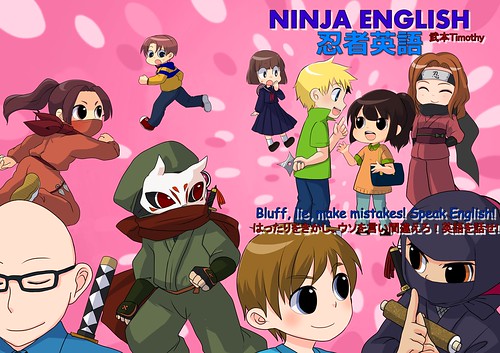Tuesday, October 20, 2015
Ninja English Cover by Fujimura Miho

My style of English teaching has been influenced a lot by taking up karate practice (just the stretching and forms) at the Arinaga Dojo in Yamaguchi. The effectiveness of Arinaga Sensei's teaching is a marvel to behold. He has five-year-olds performing high rotating kicks that would knock my head off. I do not take part in the sparring.
In line with Arinaga Sensei's teaching, my students need a lot more practice in forms (kata) and they need to stretch there minds (rather than their legs) at the very start of every the lessons. "Stretching the mind" means in this case, experiencing meaninglessness since that appears to be the biggest block to speaking. Recent psychological research has shown that experiencing meaningless is as scary as thinking about ones death (Heine, Proulx, Vohs, 2006).
My students also need to think of English as a martial art, and conversation as sparring, because politeness is almost as much a barrier to effective communication. I tell them to hit their partners with a barrage of questions, like a hail of ninja throwing stars.
Artwork of ninja and other figures provided by Miho Fujimura. Thank you very much.
Heine, S. J., Proulx, T., & Vohs, K. D. (2006). The meaning maintenance model: On the coherence of social motivations. Personality and Social Psychology Review, 10(2), 88-110.
This blog represents the opinions of the author, Timothy Takemoto, and not the opinions of his employer.
